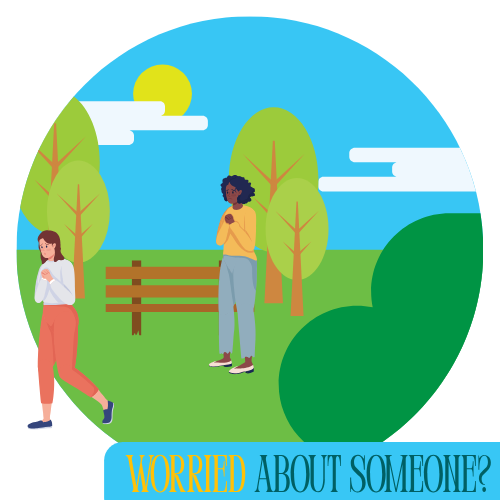This information is a suicide prevention factsheet for families, whānau, friends, colleagues, teachers and classmates of people who are distressed or showing suicidal behaviours (eg, attempted suicide, self-harm and suicidal thinking).
If you're worried that someone might be thinking about suicide, don't be afraid to ask them directly.
If someone has thoughts or feelings about suicide, it's important to take them seriously. It can be really hard to tell someone you care about that you are feeling suicidal.
If someone tells you they are thinking about suicide, thank them for telling you, and invite them to keep talking with you. Let them know there is help available to them. Encourage them to get help and talk to someone about what they are going through.
A person who is thinking about suicide might not ask for help, but that doesn’t mean that help isn’t wanted. They might feel ashamed, like they don't deserve help, or like no-one can help them. People who feel suicidal often feel that their family, whānau and friends would be better off without them.
Lots of people feel suicidal at some time in their lives. It can be impossible to have hope that things will get better.
Support from people who care about them, and connection with their own sense of culture, identity and purpose, can help them to find a way through.
If you think someone may be suicidal, ask them. It could save their life.
- Asking about suicide will not put the thought in their head.
- Ask them directly about their thoughts of suicide and what they are planning. If they have a specific plan, they need help right away.
- Listen and don’t judge. Take them seriously and let them know you care.
- Help them to find and access the support they need from people they trust.
- Don't leave them alone – make sure someone stays with them until they get help.
- Support them to access professional help. Offer to help them make an appointment, and go with them if you can.
- If they don't get the help they need the first time, keep trying. Ask them if they would like your help explaining what they need to a professional.
Signs to look for
If someone shows one or more of these signs, it doesn't necessarily mean they are suicidal, but they may need support.
You might notice they:
- tell you they want to die or kill themselves
- access things they could use to hurt themselves, like a rope or gun
- read or write about suicide online, or post photos or videos about suicide
- become obsessed with death
- become isolated or withdrawn from family, whānau and friends
- don't seem to be coping with any problems they may be having
- have changes in mood – becoming depressed, angry or enraged
- hurt themselves – for example, cutting skin or taking an overdose
- feel worthless, guilty, whakamā or ashamed
- have no hope for the future
- use drugs or alcohol to cope with difficult feelings or thoughts
- lose or gain a lot of weight, or have unusual eating patterns
- sleep a lot more than usual, or stop getting enough sleep
- seem to have lost interest in life, or things they used to enjoy
- give away possessions, pay back debts or 'tie up loose ends'
- stop taking their medication
- suddenly seem calm or happy after they have been depressed or suicidal.
If you think that someone might be at risk, pay attention to changes in their behavior and trust your instincts.

